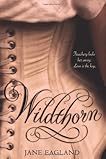 Wildthorn
Wildthorn by Jane Eagland
My rating: 3 of 5 stars
Wildthorn / 978-0-547-37017-0
Louisa Cosgrove Is having a bad day. When her planned trip to become a paid companion and governess ends with an unscheduled stop - to her - at the local insane asylum, she must grapple with many questions: Why is she here? Is it an accident? Did her family send her here? How can she get out?
The setup is swiftly achieved and the story quickly becomes the standard Victorian-trapped-unfairly-in-an-insane-asylum plot. Louisa must face the inhumane conditions of the asylum, the uncaring attendants, the bad food, the isolation, and the impending madness that is caused not by any a priori madness on her part, but rather by the maddening conditions under which she is forced to live. Most of the story concerns the mystery of who sent Louisa to the asylum, and which member of her family is responsible for her fate. The story is told through an alternating series of the horrific day-to-day life at the asylum, and through a series of flashbacks that reveal more of Louisa's personal history and more of the characters of her family members - all of whom stand out as potential traitors to Louisa's well-being. The other major thrust of the story is Louisa's emerging lesbianism, as she develops relationships with her dear cousin and an asylum attendant.
It's difficult to know how to rate "Wildthorn", as there's definitely a sense that if you've read one standard Victorian-trapped-unfairly-in-an-insane-asylum novel, then you've read them all. On the other hand, the plot is presented so fluidly that it's hard not be sucked into the trials and tribulations of Louisa's life. A very modern young woman, her life's ambition is to be a doctor, and not merely some trophy wife destined to spend her days deliberating over what to serve at dinner to a brutish husband; it's hard for the reader not to identify with Louisa and share her anguish at being bottled up against her will.
However, much of the novel revolves around her various escape attempts, and it's hard to shake the feeling that the novel is slogging slowly to the finish line. There's also not much depth and complexity to the characters - Louisa's defining traits are her feminism and her lesbianism, and outside of that she doesn't seem to have much to define her. To the author's credit, some attempts are made to inject greater depth into Louisa's villainous family members, by providing them all with different motivations for their bad behaviors, but their excuses are so flimsy that at the end of the day they all seem so cartoonishly villainous that any gestures of forgiveness on Louisa's part seem less of a gesture from the heart and more of a gesture from a severely damaged mind. Also, as the answers start coming near the end, more than a few plot threads are left severely dangling, such as the entire "Lucy Childs" name aspect, which doesn't really make sense to me, but further mention would probably be spoiler-ish, so I digress.
A recommendation for "Wildthorn" will hinge largely on whether you feel the world needs another Victorian-trapped-unfairly-in-an-insane-asylum novel. If feel that you've read it all before and don't think you can slog through another, then "Wildthorn" isn't for you. If, on the other hand, you enjoy the genre and are looking for a new angle to enjoy it from, Louisa will capture your interest and is intensely easy for modern readers to sink easily into. As for me, I enjoyed the novel and sped through to the finish, but I doubt I'll feel called to read it again a second time.
NOTE: This review is based on a free Advance Review Copy of this book provided through NetGalley.
~ Ana Mardoll
View all my reviews



0 comments:
Post a Comment